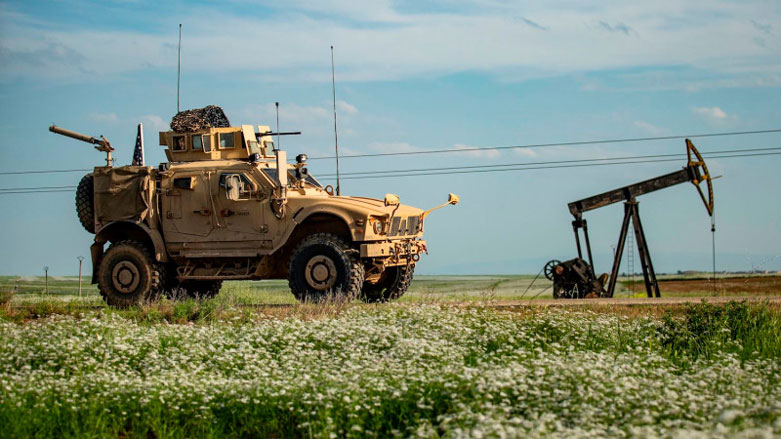Russia accuses US of ‘illegally trading’ in Syria’s oil resources

ERBIL (Kurdistan 24) – The Russian government on Friday accused the United States of “illegally trading” in Syria’s oil resources, in response to media reports that local Kurdish-led forces in northeastern had Syria made an agreement with an American company to modernize oilfields there.
Sen. Lindsey Graham (R, South Carolina) first revealed on July 30 that the Syrian Democratic Forces (SDF), the partner of the anti-ISIS Coalition in northeast Syria, had signed a deal with the US firm, Delta Crescent Energy.
Graham’s remarks came during testimony from Secretary of State Mike Pompeo before the Senate Foreign Relations Committee on the State Department’s budget for the next fiscal year. Pompeo confirmed his support for the oil agreement.
Read More: Pompeo supports SDF agreement with US company to modernize Syrian oil fields
Russia's Ministry of Foreign Affairs said the deal amounted to “systematic violations of international legal standards and international humanitarian law by Washington, its commitments as an occupying power.”
Moscow’s statement claimed the US is “illegally occupying territories in the northeast and south of Syria. Moreover, it is taking part in robbing and illegally trading in the country’s natural resources that are the asset of all Syrians.”
It then pointed out that the plans were being made against the backdrop of the toughening of sanctions against the Syrian regime.
On June 17, the Trump administration announced a comprehensive set of sanctions on Syria, known collectively as the Caesar Act.
The goal is to force the Assad regime to cease its atrocities against the Syrian people and to implement UN Security Council Resolution 2254, which provides for a political settlement of the country’s civil war to include a new constitution and “free and fair elections.”
The Russian state that has militarily intervened in Syria since 2015 to support the Syrian regime and is opposed to the US presence in Syria. While the US and its local partners fought against the Islamic State, Moscow supported the Syrian regime.
Russia appears to be concerned that the continued US presence combined with Western sanctions against the Syrian regime could undermine Damascus and prevent it from taking control of all Syrian territories it lost during the civil war.
Although US President Donald Trump initially decided last year to withdraw US forces from northeast Syria following a phone conversation with Turkish President Recep Tayyip Erdogan in October, he was later convinced to keep troops in the northeast to prevent the oil fields from falling into the hands of Iran or the Islamic State.
As a result, there are still US troops in the Hasakah and Deir al-Zor, which contain the majority of Syria’s oil resources even as the US withdrew from bases surrounding Kobani, Manbij, and Raqqa that were later taken over by the Russian military.
Moreover, the Syrian Kurds reached a deal with Damascus brokered by Russia, which resulted in the entry of Russian and Syrian forces into northern Syria. However, the continued US presence in the oil-rich regions prevents Assad and Russia from entering these regions. The previous deal between Damascus and Syrian Kurds only allows for Syrian troops in the areas near the border.
Russia has criticized the continued presence in oil-rich regions, complaining that it prevents the Syrian regime from controlling its own resources.
“Russia has been clear in its demand that all of Syria’s natural resources must be relinquished to the control of the Assad regime in Damascus,” Nicholas Heras, Middle East Portfolio Manager at the Institute for the Study of War, told Kurdistan 24.
“So far, the oil resources of SDF-controlled eastern Syria have more often than not made their way to pro-regime actors backed by Damascus,” he said, adding, “What Russia most fears is that the US and the SDF, through a small oil deal, will set a massive precedent and a formidable fact on the ground that Russia cannot reverse to the benefit of Assad.”
Jim Reese, one of the leaders of Delta Crescent Energy, told the Washington Examiner in October that he and his partners had filed an application to the federal government for a plan that would be a US-led effort to develop oil fields in the area.
The plan would exclude Assad since he “slaughtered hundreds of thousands of Syrians” and would infuriate Assad, Russia and Iran.
Turkey, Iran, and the Syrian government all condemned the deal last week, but the Russian official reaction only came yesterday.
Heras continued, “This deal explicitly acknowledges what has been implicitly recognized by all of the foreign actors deeply involved in the Syrian crisis: that Syria’s fragmentation is real, and the commanding heights of Syria’s best natural resources may never again come back under the control of Assad in Damascus.”
Nevertheless, neither the SDF nor the Autonomous Administration of North and East of Syria (AANES) has confirmed that any agreement has been made. They were also reluctant to make any comments to the press on the deal, likely out of fear of potential regional backlash.
Abed Hamed al-Mehbash, the co-chair of AANES, was quoted by the local North Press news agency saying that the administration is still studying requests by “many Russian and American companies to operate in north and east Syria.”
Editing by John J. Catherine
